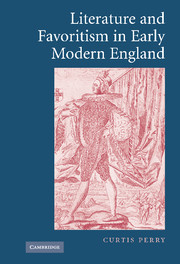Book contents
- Frontmatter
- Contents
- Acknowledgments
- A note on texts
- 1 “Prerogative pleasures”: favoritism and monarchy in early modern England
- 2 Leicester and his ghosts
- 3 Amici principis: imagining the good favorite
- 4 Poisoning favor
- 5 Erotic favoritism as a language of corruption in early modern drama
- 6 “What pleased the prince”: Edward II and the imbalanced constitution
- 7 Instrumental favoritism and the uses of Roman history
- Afterword: “In a true sense there is no Monarchy”
- Notes
- Index
7 - Instrumental favoritism and the uses of Roman history
Published online by Cambridge University Press: 22 September 2009
- Frontmatter
- Contents
- Acknowledgments
- A note on texts
- 1 “Prerogative pleasures”: favoritism and monarchy in early modern England
- 2 Leicester and his ghosts
- 3 Amici principis: imagining the good favorite
- 4 Poisoning favor
- 5 Erotic favoritism as a language of corruption in early modern drama
- 6 “What pleased the prince”: Edward II and the imbalanced constitution
- 7 Instrumental favoritism and the uses of Roman history
- Afterword: “In a true sense there is no Monarchy”
- Notes
- Index
Summary
Like the Leicester legend or the story of Edward II, histories of the early Roman empire by Suetonius, Cassius Dio, and especially Tacitus provided politically minded English subjects with a repertoire of representative anecdotes and precedents with which to take the measure of the problem of contemporary favoritism. The best-known and most important figure here is of course Sejanus, the great and loathsome favorite of the emperor Tiberius, though other imperial minions also figure prominently in topical retellings of Roman history. Particularly after the rise of Buckingham, the figure of Sejanus becomes an omnipresent touchstone for the corrupting influence of royal favorites. As early as 1621, a popular verse libel aimed at Buckingham complained that “Sejanus Doth bestowe / what ever offices Doe fall,” and the parallel became notorious as of May of 1626, when Sir John Eliot – summarizing the charges brought against Buckingham by the House of Commons – compared him at length and in detail to Tacitus's Sejanus. “If the Duke is Sejanus,” Charles is supposed to have said upon hearing of Eliot's parallel, “I must be Tiberius.”
Because the terms of opprobrium leveled at Buckingham lingered in the political imagination long after the duke's death, comparisons with Sejanus were rehearsed in the controversy surrounding the attainder and execution of the Earl of Strafford. The latter is treated as a “second Sejanus” in a number of poems and pamphlets from the 1640s and 1650s.
- Type
- Chapter
- Information
- Literature and Favoritism in Early Modern England , pp. 229 - 275Publisher: Cambridge University PressPrint publication year: 2006

